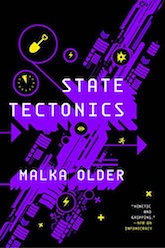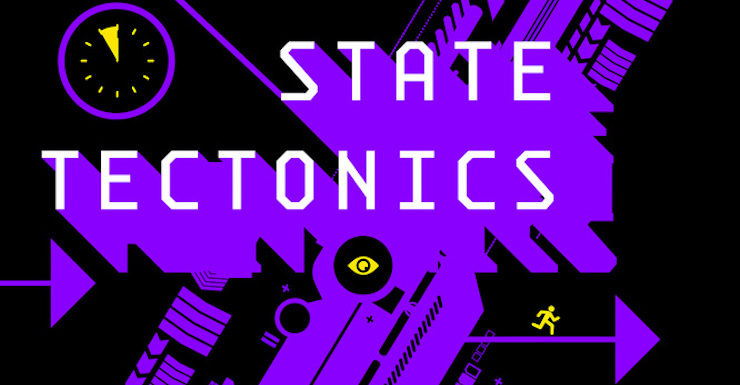Malka Older’s Centenal Cycle began in 2016 with Infomocracy. Now it ends, at least for now, with State Tectonics, the third book in the sequence.
Those titles reward examination. At first glance, “infomocracy” looks like a portmanteau, a combination of “information” and “democracy,” implying a system where access to democracy is increased through greater provision of information. And as Infomocracy revolves around elections, access to information, and democratic processes (and with antagonists who attempt to subvert such processes), this reading seems to fit.
But Information is also an organisation within the world of the Centenal Cycle: a well-meaning organisation that disseminates information and validates elections, that possesses essentially a monopoly on information infrastructure within the microdemocracy system that exists within the world of the Centenal Cycle. A different reading of Infomocracy turns it into a portmanteau relating to democracy’s roots: the rule of information (or of Information).
Both, it seems to me, are valid readings. Especially in light of the developments of State Tectonics.
We can play the same game of semantic nuance with the title of State Tectonics. “Tectonics” is a word for the structure and properties of the Earth’s crust and its development over time: a development that can be slow and incremental (the growth of mountain ranges, the changing shapes of continents) or provide sudden violent shocks that intrude into human experience: volcanoes and earthquakes are also the result of tectonic processes. And “state,” as a noun, can either mean a particular condition that something or someone is in at any given time, or it can refer to a political entity united under a government.
The events of State Tectonics bring all the aspects of this wordplay to the fore. Human society is never exactly static, and in State Tectonics change both incremental and shocking is underway: changes in both the particular condition of the centenal system and in the political “states” that relate across it.
Malka Older is an accomplished writer, simultaneously interested in social systems and in people and their complicated relationships to each other and to the social and technological systems in which they live and work. Each of her novels have expanded upon the cast of the previous one: if Infomocracy belonged primarily to Mishima and Ken, and Null States to Mishima and Roz, State Tectonics belongs to primarily to tech whizz Maryam, with supporting protagonist roles played by Mishima, Roz, and Mishima’s protégée Amran.
Some years have passed since the events of Null States. It’s nearly time for a new election across the microdemocratic world. Mishima, now an ex-spy since her cover was blown by the Chinese, has a two-year-old child with Ken, and is reluctantly participating in Information political manoeuvring to be elected to an advisory council to the next Supermajority government. Roz is happily married and pregnant with her first child, and is supervising Information’s oversight of the beginnings of a transport tunnel beneath the Earth’s mantle. And Maryam, living in La Habana, has just been asked by her boss to investigate a series of attacks on Information data processing centres: attacks in which no one was harmed, but whose purpose no one can figure out. Said boss puts her in touch with Tasreen Khan, the eighty-nine-year-old mastermind behind the original Information project now living in quiet retirement in Dhaka, in the hopes that between them, they can figure out what the endgame of these attacks are. But Maryam isn’t entirely sure that she trusts Khan, and her job gets a lot more complicated—and a lot less like her original job description—when she’s asked to track down competing sources of information, information that isn’t on Information: basically to spy.
It turns out that there are a lot of forces working to change the world, and maybe Information isn’t best placed to be an impartial unelected unaccountable arbiter anymore.
Buy the Book


State Tectonics
Maryam is an enormously relatable character, and a deeply compelling one. Her relationship with soldier Núria is complicated by her insecurities—her last lover was a senior member of Information, who dumped her when she became Maryam’s boss—her jealousy of Núria’s glamorous friends, and the amount of time that both of them spend travelling for work. Maryam’s not used to being a spy, and she doesn’t think she’s particularly good at it. But within her field of technological competence, she’s very confident indeed.
(And can I just say that it’s a delight to see a character who’s an observant Muslim and a woman who loves women, and her religion is the absolute last thing that’s in the way of her having happy relationships.)
Mishima, meanwhile, is itching under the pressure to be a spokeswoman for bureaucracy. She’s a woman of action, and needs to act. Naturally she leaps on the first opportunity to do what she’s always done well—even if it affects her relationship with Ken.
State Tectonics is excellently-paced, complicated, twisty, full of intrigue and incident. It’s also a truly international vision of the future: the action ranges from Doha to Dhaka, from Nairobi to New York, from Cuba to Canadian Guelph to Belgium and Istanbul, all of these locations drawn with an eye for place and atmosphere that makes them feel real and vivid, inhabited futures. The characters are strongly drawn individuals, each interesting and compelling in their own way.
But the true argument of Older’s State Tectonics is about the tension within human-made social systems, human systems of government: the dynamic tension between powers and the delicate balance—the delicate distinction—between change and chaos, between stability and stasis.
It’s a fascinating argument, and State Tectonics is a fascinating and immensely readable book, a fitting capstone to the series.
And now that it’s done, I’m really interested in seeing where Older takes her manifold talents next.
State Tectonics is available from Tor.com Publishing.
Read an excerpt here.
Liz Bourke is a cranky queer person who reads books. She holds a Ph.D in Classics from Trinity College, Dublin. Her first book, Sleeping With Monsters, a collection of reviews and criticism, was published in 2017 by Aqueduct Press. It was a finalist for the 2018 Locus Awards and was nominated for a Hugo Award in Best Related Work. Find her at her blog, where she’s been known to talk about even more books thanks to her Patreon supporters. Or find her at her Twitter. She supports the work of the Irish Refugee Council, the Transgender Equality Network Ireland, and the Abortion Rights Campaign.










